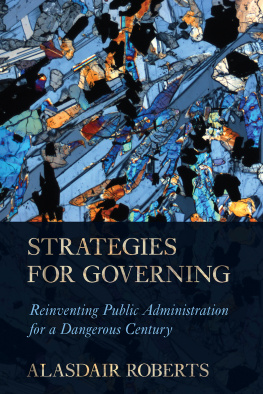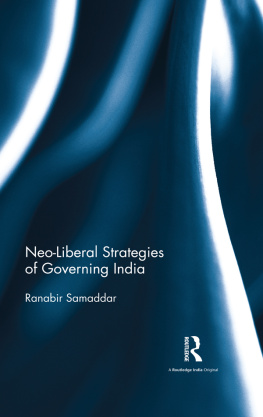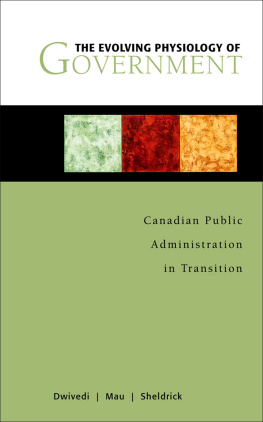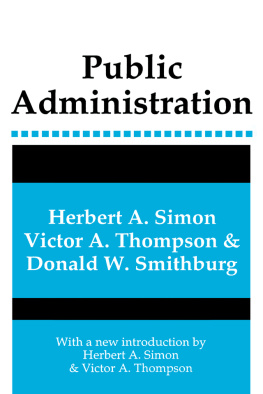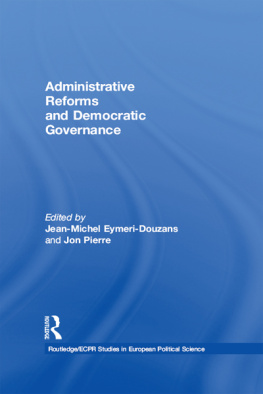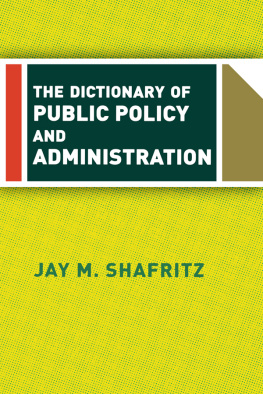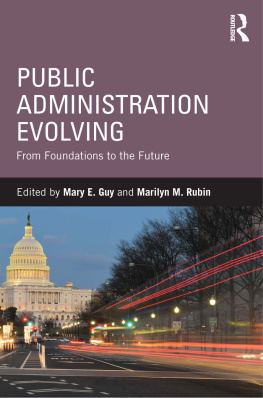I NTRODUCTION
Time for a New Approach
This is a book about public administration and what its aims should be. It is intended for researchers in the field, practitioners in public service, and students preparing to become researchers or practitioners, but it will also interest readers concerned about building secure and thriving societies.
My argument is straightforward: In the United States, the field of public administration was launched almost a century ago by people with bold aspirations. They were not interested only in the efficiency of government offices; they wanted a thorough overhaul of the creaking American state so that it could manage the pressures of modern-day life. Unfortunately, this expansive view of the fields purpose has been lost. Over the last four decades in particular, the focus within the field has been mainly on smaller problems of management within the public sector. This narrowing of focus might have made sense in the United States and a few other advanced democracies in the waning decades of the twentieth century, but it does not make sense today. As we shall see, many people have recently protested this shrinking of ambitions. It is time for a change of direction. We need to recover an expansive view of the field, and I propose a way to do so.
I proceed from the premise that it is impossible to talk about public administration without also talking about the larger challenge of governing a state. Woodrow Wilson, often seen as a founder of American public administration, also made this claim in a famous 1887 essay. Before we can say how the state should be administered, Wilson insisted, we have to talk about the things that the state must do. We can turn Wilsons proposition around as well: before we consider what the state ought to do, we must know what it is actually capable of doing. In other words, the overall approach to governing determines administrative priorities, while practicalities of administration constrain our choices about the overall approach to governing.
My argument has a sense of urgency as well. We must recover the capacity to talk about the fundamentals of government, because the fundamentals matter immensely. Right now, there are billions of people on this planet who suffer terribly because governments cannot perform basic functions properly. People live in fear because governments cannot protect their homes from war and crime. They live in poverty because governments cannot create the conditions for trade and commerce to thrive. They live in pain because governments cannot stop the spread of disease. And they live in ignorance because governments do not provide opportunities for education. The expectations that we hold of our leaders can be stated simply: They should protect us from foreign enemies, maintain internal order, increase prosperity, improve well-being, and provide justice. Even in the twenty-first century, most governments on this planet fail to do this.
In defense of leaders, it might be said that our expectations are easily stated but not so easily fulfilled. Governing is hard work. Leaders of most states struggle just to understand what is going on inside and outside their countrys borders. Then they must determine the relative importance of national goals, given that resources are scarce and goals are often incompatible. Leaders must next decide, under conditions of great uncertainty, which policies are likely to achieve their priorities. Leaders struggle to execute these policies too. Institutions are hard to build and run effectively. It is not easy to find soldiers, bureaucrats, policemen, and judges who are competent and willing to follow instructions. And even well-considered plans go awry because of an unexpected change of circumstances.
The challenge of governing was described by the Florentine diplomat Niccol Machiavelli a half millennium ago. Machiavelli warned the rulers of Italian city-states such as his native Florence that their work was fraught with danger. Sometimes the threat was posed by other city-states, and sometimes it arose within the city walls because people were restless and hard to please. A clever leader sought advice on how to build institutions that would bolster his authority both inside and outside the city walls. But even strong institutions could be toppled by the tempest of public affairs. They had to be renovated constantly to keep up with changing conditions, and this was very hard to do. States that did not constantly renew themselves, Machiavelli warned, were likely to collapse.
Some commentators have suggested that Machiavelli lived in unusually precarious times. In some ways, though, the rulers of sixteenth-century Florence had it easy. Florence was merely a city-state: its walls contained only four square miles of territory and sixty thousand people. Today the average state has more than two hundred thousand square miles and more than thirty million people. Compared to Florence in 1500, China has a million times as much land and twenty-three thousand times as many people. The institutional apparatus required by a state like China is more vast and complex than anything Machiavelli could have imagined.
There are additional complications for todays rulers. Machiavelli warned about renewing institutions to keep up with the times, but the world in which he lived was relatively stable. In important ways, it was not much different when he died in 1527 than when hed been born sixty years earlier. By comparison, the pace of change todaysocial, economic, technologicalis blistering. The planets current population of seven billion is also more restless: urbanized, literate, wired, and mobile. And they have higher expectations of their rulers. Standards for security and order, public services, and protection of human rights are more demanding today than they were in the sixteenth century.
The leaders of modern-day states have a difficult assignment. They must devise a strategy for leading their countries toward security, order, prosperity, and justice. Next, they must design and build institutions that translate their strategy into practice. And then they must deal with the vicissitudes of time and chance, adapting strategies and institutions in response to altered circumstances and unexpected events. To do this well, leaders need advice about the machinery of governmentwhat it is capable of doing, how it should be designed and constructed, how it ought to be run, and how it can be disassembled and reconstructed. Researchers who work in the academic discipline of public administration should be expert in providing this sort of advice. One of their most important functions is helping leaders to devise strategies for governing that are effective, durable, and normatively defensible.

